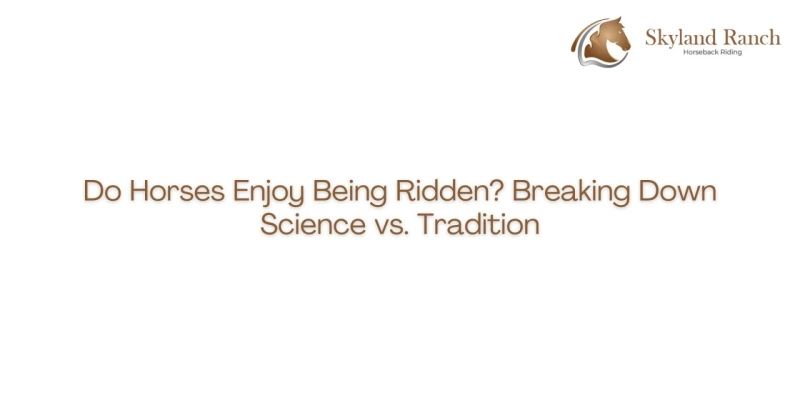Since ancient times, human beings have been dependent on horses- as work beasts, as sports horses, and as recreational animals. Today, horseback riding often takes the form of recreational adventures like horseback trail riding near Seattle, where riders escape city life and connect with nature. But there is a greater question beneath the saddle: Do horses like being ridden?
It is the subject of convergence between tradition, science and contemporary animal welfare. Some of the riders claim that their horses enjoy the work but some claim that riding is unnatural and even uncomfortable. Being a lifelong rider and lover of horses, I will deconstruct the science, the customs, and what the facts tell us about the health of horses.
Tradition: The Human-Horse Bond
Thousands of years have passed and horses have been companions and partners. Horses in most cultures were a lifeline, they used them to carry their goods, soldiers to war, or plowshare, or to till their farms. Gradually, there arose traditions concerning horseback riding which stressed on partnership, trust and even spiritual connection.
Riders tend to recount situations when they are trail riding, the horse seems to be relaxed, flicking its ears forward, its tail swinging softly, and long-strided and confident. They are taken to be the signs of a happy and relaxed animal. Trail guides, especially those offering horseback trail riding near Seattle, frequently note how their horses perk up when heading out on familiar trails, suggesting anticipation rather than reluctance.
Tradition itself does not answer the question whether horses like to ride, it is simply our perception of their actions. Science is necessary to know what is happening.
Science: Do Horses Experience Pleasure or Tolerance?
To examine the response of horses to riding, equine scientists examine the levels of stress, body language, and biomechanics. Here are a few key insights:
- Physiology and Stress Hormones: The studies on cortisol (stress hormone) demonstrate inconclusive findings. In other instances, horses show minimal or no cortisol rise on the ride indicating that the horse riding is not a stressful activity per se, particularly when the horse is highly trained and the rider is mounted.
- Pain and Saddle Fit: Most of the pain that comes with riding is due to improper riding or inappropriate saddles. Research indicates that inappropriate tacking may result in soreness and back pain of the muscles, as well as, behaviour. On the other hand, well-fitting riders and saddles ensure that the strain is reduced and the experience becomes quite neutral or even pleasing.
- Natural Movement and Exercise: Horses are built to move. Their gaits when ridden on the saddle resemble normal patterns of movement and in a light and proper riding the exercise may be beneficial. Small paddocks also ensure that horses in those paddocks are not bored by trail rides.
And do horses enjoy being ridden, do they? Science indicates that though they can not feel happiness in the human spirit, most horses seem to be at ease, restful, and even interested in the process of riding when handled in a prudent way.
Behavior Speaks Louder Than Words
Since horses cannot communicate, through words, the rider is forced to use body language:
- Signs of Enjoyment or Comfort: Hanging head, forward-thinking ears, step by step, and warm-hearted eyes. Other horses also whinny or nicker whenever they see the saddle, and have positive associations with the saddle (such as trail adventures).
- Signs of Discomfort: Pinning ears, swishing tail, hollowing of the back or refusing to walk forward. These are obvious indications that the horse is either suffering or not content.
Trail guides at ranches that specialize in horseback trail riding often emphasize training their horses to feel safe and calm in diverse environments. When horses feel confident over woody trails, cross streams without difficulty, or stand there dutifully when riders stand and gaze at mountains, it may well be the result of good husbandry and training.
The Role of Modern Riding Ethics
Riding today is a big and an essential burden on the riders; making the horseback riding experience as pleasant and stress-free as possible. This means:
- Investing in Proper Tack: Saddles, bridles and pads must fit well to avoid discomfort.
- Prioritizing Rider Balance: A balanced and thoughtful rider puts a lesser load on the joints and the back of the horse.
- Enrichment Beyond Riding: During off work hours, horses require time to graze, socialize and move freely. Trail rides are also included in an all-encompassing lifestyle instead of being the only exercise one does.
In settings like horseback trail riding near Seattle, where horses traverse diverse terrain, ethical practices ensure the experience remains enriching. A horse that feels safe and well-cared for is more likely to show curiosity and energy on the trail.
Reflection: Moving Forward Together
With the development of equestrian culture, it is not only whether horses like to be ridden or not. but instead "How shall we make it more pleasant for them to ride? Science helps us to pay attention to what horses are saying with their bodies, to change our practice to embody compassion and respect. We are reminded by tradition that man and horse have been living in harmony over thousands of years and that they still maintain relationships today.
At Skyland Ranch Horseback Riding we think each ride is an opportunity to bond that relationship. Whether you're a seasoned rider or a first-timer seeking horseback trail riding near Seattle, our focus is on creating meaningful experiences where horses and humans move in harmony. To protect the future of riding, it is in our hands: to honor the horse, to value the relationship, and to make the saddle a part of us, not the source of stress.


